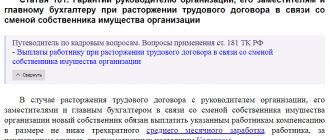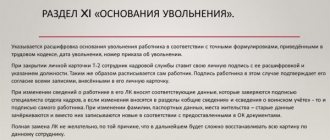Legal requirements for content
An apprenticeship agreement is a training contract concluded between an employer and a person who is looking for a job (Article 198 of the Russian Labor Code). The main difference of such an agreement is that at the time of signing the paper there is actually no labor relationship between the parties to the transaction.
A similar document can be signed with an existing employee of the enterprise who wishes to improve his skills or undergo retraining. The deal is concluded on the following terms:
- without interruption from work - in this option, the student agreement becomes an addition to the regular employment agreement;
- with a break from work.
Based on Article 206 of the Labor Code of Russia, the requirements outlined in the text of this document should not contradict the norms of the labor legislation of the Russian Federation.
Termination of the student agreement
The employee may even be completely relieved from his main job;
- During the apprenticeship period, students are paid a stipend, the amount of which cannot be lower than the minimum wage established by federal law. Thus, in addition to paying for training, the employer bears the cost of paying the scholarship;
- the period during which the student undertakes to work for this employer after completion of training is established;
- the grounds for termination of the student agreement are established;
- The scholarship and other training expenses are returned to the employer only if the employee fails to fulfill his obligations under the student agreement. Please note: as a general rule, expenses incurred by the employer are reimbursed in proportion to the time not worked after completion of training.
Attention
This agreement is drawn up in two copies having equal legal force - one for each party. The parties have no mutual claims against each other. Details and signatures of the parties: Employer: “Alfa” Address: 125008, Moscow, st. Mikhalkovskaya, 20 INN 7708123456 Account number 40702810400000001111 in JSCB "Nadezhny" Account number 30101810400000000222 BIC 044583222 Employee: Bespalov Petr Andreevich Passport series 46 02 No. 545177 issued by U Internal Affairs of the Voskresensky district of the Moscow region April 15, 2002
Registered: 125373, Moscow, blvd. Yana Rainisa, 24, bldg. 2, apt. 474 Signatures of the parties: Director A.V. Lvov P.A.
By their nature, travel expenses when sending an employee for off-the-job training are compensation payments and a component of wages. The employer is obliged to pay them by law. To collect travel expenses means to worsen the employee’s situation in comparison with the norms of the law. Other courts believe that travel expenses can be recovered and collect from employees daily allowances, money for renting accommodation and travel.
General standards
Information that is required to be indicated in the student agreement is strictly regulated by Article 199 of the Labor Code of Russia. What is included in the document :
- the full name of the organization that takes responsibility for the financial side of training the future employee;
- Full name of the student;
- the exact name of the profession (qualification) that will be acquired during the study process;
- rights and obligations of the parties;
- terms of termination;
- duration of study - start and end dates of studies;
- additional conditions - the possibility of changing and supplementing the terms of the agreement: this is permitted only by mutual agreement of the parties.
It is advisable to include options for extending its validity period in the contract. Among them are the following:
- Illness of the student (confirmed by medical documents: certificate or sick leave).
- The period of military training.
- Other situations provided for by law.
Student agreement: content features and dispute resolution practice
- Important
Themes:
- Student agreement
Question At the factory, an apprenticeship contract was concluded for 3 months with a person already working at the factory. He studied for one month and the mentor and the head of the site came to the conclusion that he could not cope. The student is not against the contract being terminated. How to do this correctly? What documents need to be completed? Answer Answer to the question: The student agreement is terminated at the end of the training period or on the grounds provided for in this agreement (Art.
Obligations of the company management and the student
One of the most important sections is the rights and obligations of the parties. What the employer must do:
- Sign an agreement with an educational institution or individual who has the right to provide teaching services. The cost of training is also indicated here - this is necessary so that if such a need arises, the payer can prove the validity of his claims for reimbursement of the funds spent.
- Provide the student with the opportunity to obtain theoretical knowledge and practical skills.
- It is guaranteed to preserve the employee’s job, his average salary, and to finance travel expenses (if necessary) during the training period. The basis is Article 187 of the Labor Code of the Russian Federation.
- If necessary, assign an instructor to an employee from among employees who have the necessary skills. An additional agreement must be concluded with the person who will act as a mentor if training responsibilities were not included in the list of his job functions. This is done so that the “educator” is paid additionally for such work. The basis is Article 151 of the Labor Code of Russia.
- If retraining or training is carried out on the territory of the company, then management must provide a specially designated place for this (Article 196, Part 2 of the Labor Code of the Russian Federation).
- Pay for accommodation for an employee undergoing retraining if for this he had to travel outside his hometown (Article 187 of the Labor Code of the Russian Federation).
- Release the employee from performing his official duties while studying. If retraining takes place without interruption from the main job, make changes to this person’s work schedule.
- Other duties permitted by law.
The employer has the right to set criteria for the success of completed training and conduct testing to determine the level of knowledge acquired.
The trainee must receive an education in the specialty specified in the contract and work for this company for some time. The duration of the “working out” is agreed upon by the parties before signing the contract.
Termination of the agreement
The contract terminates after the end of the training period (Article 208 of the Labor Code of Russia).
Other possible reasons for cancellation may be the conditions that were provided in the text of the contract. Since the student agreement is part of the employment agreement, its termination falls under Article 77 of the Labor Code of the Russian Federation . It describes all possible reasons for termination of cooperation:
- Agreement of the parties (Article 78 of the Labor Code of Russia).
- Expiration of the employment contract (Article 79 of the Labor Code).
- Cancellation of an agreement at the initiative of the employer (Articles 71 and 81).
- Termination of the contract at the employee’s own request (Article 80).
- Transfer of an employee to another position or to another employer.
- Refusal by an employee to continue the employment relationship in the event of a change in the management of the organization, its jurisdiction or reorganization (Article 75 of the Labor Code of the Russian Federation).
- Other options described in the law.
Important: if the apprenticeship contract was concluded with a person who was looking for a job for the first time, then it is not possible to terminate the agreement due to the employee’s refusal to move to another position or due to a change in the terms of the contract.
Apprenticeship contract: employer's protective conditions
At the same time, the cost of training is quite a large amount, which can amount to the employee’s earnings for several months. Then it happens that after training, the employee, bound by the terms of the apprenticeship contract on the obligation to work for the employer for a long period of time, is not accrued or paid, the terms of the employment contract on allowances, additional payments and compensations are violated, and other violations are committed. Out of despair, an employee is often forced to resign and terminate both the employment and apprenticeship contracts before the expiration of the agreed period.
And then the employing organization immediately files a lawsuit against the employer for a very impressive amount. The law provides for a number of effective ways to protect against unfair actions of employers.
We invite you to familiarize yourself with: Car pledge agreement. Sample
In accordance with the rules specified in Chapter 32 of the Labor Code of the Russian Federation, an apprenticeship agreement is a written document in accordance with which the employer sends a future employee for training, or creates conditions for professional retraining of a current employee of his organization.
The apprenticeship agreement must be concluded in writing in two copies, each of which remains with the parties who signed it. The agreement has a certain validity period, which corresponds to the time required to complete the educational process or retraining.
Considering the fact that students are equal to full-fledged employees of the company, all rights and obligations assigned to them in accordance with the current norms of the Labor Code of the Russian Federation must be realized in their respect.
The legislator determines that the student agreement must contain a number of conditions that are mandatory for both parties to the contractual process. Among the most significant conditions that should be reflected in the agreements are:
- full names of the parties indicating their registration and permanent location.
- The period during which the student acquires the necessary professional training and can begin his official duties in the organization.
- Indication of the specific specialty that the employee will have to obtain as a result of completing the educational process. Often the qualification requirements that must be met by the employee undergoing training under the apprenticeship agreement are also specified.
- A financial issue that involves payments from an employer to its employee. This should indicate the specific payments that the employee will receive during training - scholarships and wages during the practical part of the educational process.
- The responsibility of the manager to provide the employee with all the necessary materials that are required for a better educational process, as well as the imposition on the employer of obligations to organize a normal training process in accordance with the student agreement.
- The employee’s responsibilities to obtain the necessary professional skills, to attend an educational institution, as well as the obligation according to which the employee will have to work in the organization that has entered into an agreement with him for a certain time after the end of the apprenticeship agreement.
We suggest you read: Do they pay for military service in the army?
The terms of the student agreement are mandatory for all parties to the process. If it is determined that the parties are evading their obligations imposed on them in accordance with the agreements, then the agreement between them may be declared invalid and terminated.
Thus, if necessary, the employer and employee can introduce additional terms of the agreement, which they will be obliged to comply with. But at the same time, the state determines that all additional conditions that may be included in the text of the agreement must not contradict the basic constitutional principles of the legislation and not violate the current provisions of the Labor Code of the Russian Federation.
Considering the fact that students are equal to full-fledged employees, they are subject to all the requirements and rights provided for in accordance with the current standards of the Labor Code of the Russian Federation.
Article 206 of the Labor Code of the Russian Federation states that if the terms of the apprenticeship agreement are in conflict with the basic norms of labor legislation, the agreement may be declared invalid and its application in practice will be impossible.
At the same time, the legislator establishes a rule according to which all conditions that will contradict the current regulations regarding the legal relations of the employer and his employees will create the basis for the deterioration of the legal status of the student and will impose on him a significant number of responsibilities not directly provided for in the norms and principles of the Labor Code of the Russian Federation. .
The invalidity of an apprenticeship agreement can be recognized exclusively in court, or by a special state labor inspectorate. This issue is regulated on the basis of Articles 354-356 of the Labor Code of the Russian Federation. These regulations also state that the apprenticeship agreement is subject to termination in the following circumstances:
- if both parties decide to terminate their cooperation and do not make any claims to each other (Article 78 of the Labor Code of the Russian Federation);
- Termination of the agreement occurs on the initiative of the student, who must prove in court that his legal status as a result of signing this agreement was violated for the worse (Articles 79, 80 of the Labor Code of the Russian Federation);
- The employer also has the right to terminate the agreement unilaterally, however, in order to do this, he must have certain circumstances, such as ignoring the rules of the existing agreement on the part of the employee, his failure to attend an educational institution without good reason, and failure to comply with all the terms of the apprenticeship agreement signed parties earlier (Article 81,82 of the Labor Code of the Russian Federation);
- The legislator also provides for the possibility of terminating an apprenticeship agreement on the basis of circumstances that do not depend on the will of the parties, for example, upon closure of production, or as a result of its reformatting (Article 83 of the Labor Code of the Russian Federation).
We invite you to familiarize yourself with: What documents are needed to formalize a deed of gift for an apartment: a list of necessary certificates for registering a gift agreement
Cancellation at the initiative of the parties
The employer has the right to terminate the contract if the employee systematically violates discipline. Another reason may be the expiration of the main employment agreement.
An employee can resign on his own initiative, but only if he can prove the impossibility of continuing his activities in this company (Article 80, part 3 of the Labor Code of Russia). What situations are implied:
- relocation of an employee to another locality for permanent residence;
- the need for child care arises;
- a disease due to which a person will not be able to work at all;
- admission to a higher education institution as a full-time student;
- other reasons that will objectively confirm the impossibility of work, and not evasion of obligations.
For these reasons, the agreement will be terminated without guarantees of reimbursement to the employer of the funds spent on training the employee. The employee must attach supporting documents to the application for dismissal.
The law does not provide that an employee is required to prove the fact of loss of the opportunity to work for this company.
In addition, for these reasons for dismissal, the employee is freed from the need to notify the employer in advance (14 days) about the upcoming settlement.
Regarding female employees: maternity leave or maternity leave is considered a valid reason for the student not to start work after graduation. However, the working period will be considered continuous. After the end of such “vacations”, the woman must return to the enterprise and begin performing the job duties stipulated by the apprenticeship contract. If during this time the period of work has expired, then she may quit.
Consequences of withdrawal from the contract
Possible results of premature termination of the agreement should be recorded in the text initially - at the stage of its signing.
But the consequences will directly depend on the reasons that prompted the refusal of the contract. The employer has the right to stipulate in the contract the student’s obligation to work for a certain time. And also in the text of the document it is necessary to indicate other agreements between the employer and the employee: for example, to provide for the payment by the employee of compensation for training costs in the event of early cancellation of the agreement. Typically, the company is reimbursed for the following costs:
- Cost of education. It is indicated in the contract and must be confirmed by documents (payment receipts, bank statements, etc.).
- Student scholarship.
The amount of coverage is calculated based on how much time is left unworked.
For example: the contract specifies the amount for training as 250 thousand rubles and specifies a period of 36 months (3 years). Of this period, the employee performed his duties at the company only for 18 months. This means that the amount of compensation will be 125 thousand rubles (250 thousand ÷ 36 × 18). The costs incurred by the company due to payment for the student’s accommodation, travel, and meals are not compensated even if the text of the contract contains a clause on full reimbursement of training costs. This is because such costs are not legally considered to be associated with the apprenticeship. Basis - Determination of the Supreme Court of the Russian Federation No. 56-KG12−7.
Not everyone is able to receive education at the expense of budget funds, so concluding an agreement with an enterprise is an excellent option for those who do not have the financial ability to pay a lot of money for education out of their own pocket. And although this will impose certain restrictions on a person, they are not so “terrible” as to become a reason to avoid such contracts. There is always the option to terminate the agreement if the need arises. And the law will make sure that the parties to the transaction come out of this situation without losses.
Consequences of invalidating a student agreement
The conditions for recognizing a student agreement as invalid are regulated by the standards specified in paragraph 2 of Article 176 of the Civil Code of the Russian Federation. Based on this standard, upon termination of the student agreement, all parties are obliged to return all the resources they received as a result of the agreement.
Thus, in the event of termination of the apprenticeship agreement, the employee will be obliged to reimburse his employer for all expenses incurred as a result of the agreement. Expenses of this type include:
- scholarships and other financial benefits allocated to the employee personally (including payment for accommodation, food, etc.);
- the amount of payment that was paid to the educational institution as payment for the employee.
Thus, all these expenses must be reimbursed by the employee to his employer. Compensation can come in two forms: in kind and in cash.
In some cases, compensation may occur in a slightly different manner. If the employee has found a new job, he can enter into an agreement with the new employer, based on which part of the earnings will be transferred monthly to the former employer as compensation for his losses under the terms of the apprenticeship contract.






